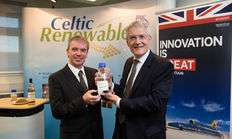- The €15 million grant will fund a biofuel facility operational by December 2018.
- The facility will produce 1 million litres of biofuel annually using ABE fermentation.
- The process uses whisky industry leftovers like draff and pot ale.
- Other winners include Nova Pangaea and Advanced Plasma Products.

Grant and Facility Details
Celtic Renewables has secured a €15 million grant to build a biofuel facility, set to be operational by December 2018. The facility will produce at least 1 million litres of biofuel annually, capable of powering cars.
Historical Context and Process
The facility will utilize the acetone-butanol-ethanol (ABE) fermentation process, which was originally developed in the UK in the early 20th century for producing acetone for explosives. This process was phased out in the 1960s due to petrochemical competition. Celtic Renewables aims to modernize and reintroduce this process using whisky industry by-products.
Raw Materials
The biofuel will be produced from draff, the sugar-rich kernels of barley used in whisky production, and pot ale, the copper-containing yeasty liquid left over after distillation.
Strategic Location and Future Plans
The company plans to open a demonstration facility, targeting a location in or near Grangemouth, which is strategically suitable for their operations. The goal is to scale up to industrial production, creating a new industry in the UK valued at over £100 million annually.
Other Winners
Other companies that won funding in the Department for Transport's Advanced Biofuels Demonstration competition include Teesside-based Nova Pangaea, which produces biofuel from forestry waste, and Swindon-based Advanced Plasma Products.

